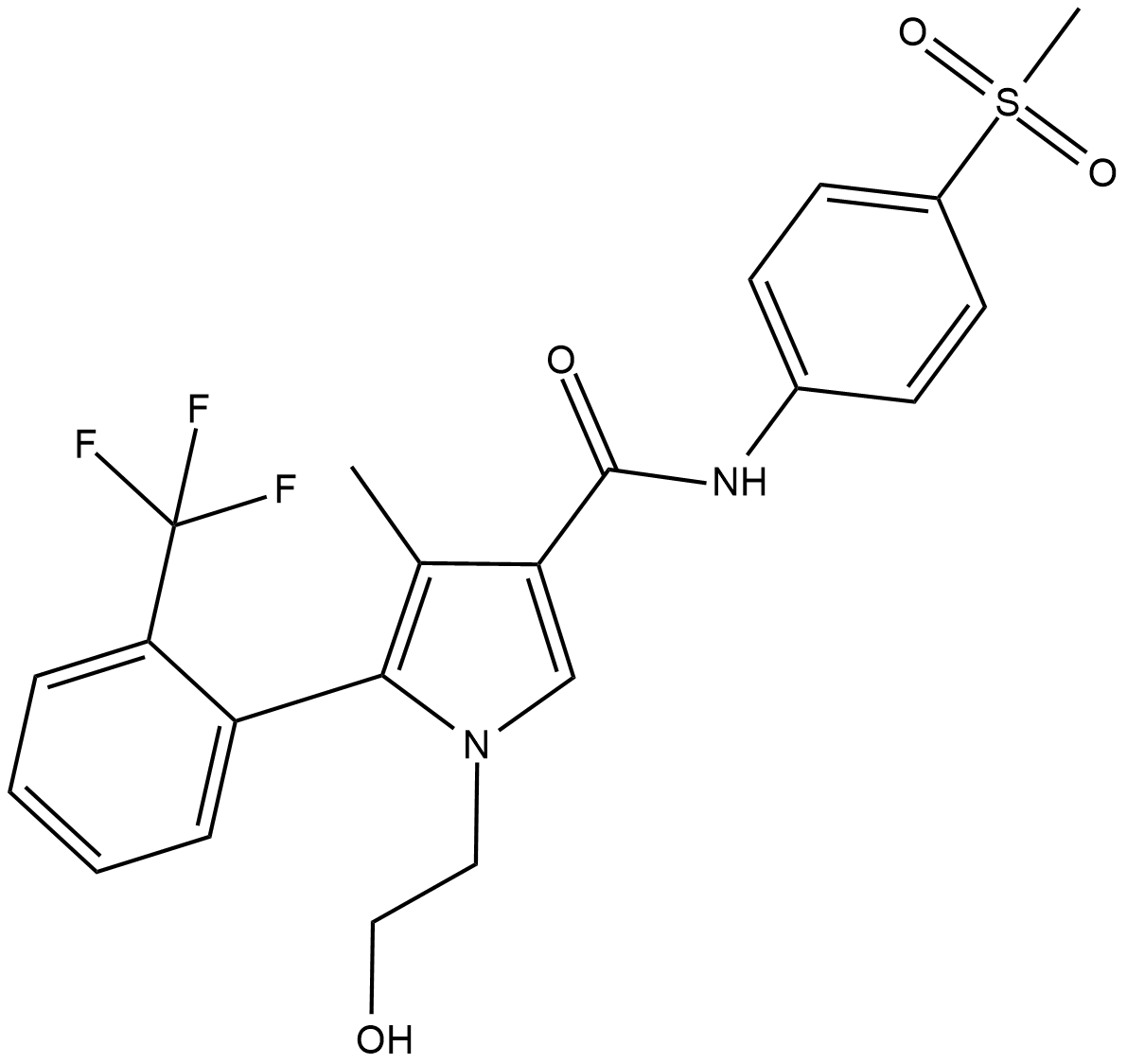Esaxerenone |
| Catalog No.GC19143 |
Esaxerenone (CS-3150), a selective nonsteroidal mineralocorticoid receptor antagonist, has been shown to bind to mineralocorticoid receptors, thereby inhibiting aldosterone binding and activation of the receptor.
Products are for research use only. Not for human use. We do not sell to patients.

Cas No.: 1632006-28-0
Sample solution is provided at 25 µL, 10mM.
Esaxerenone (CS-3150), a selective nonsteroidal mineralocorticoid receptor antagonist, has been shown to bind to mineralocorticoid receptors, thereby inhibiting aldosterone binding and activation of the receptor [1]. Esaxerenone inhibited 3H-aldosterone binding to mineralocorticoid receptor in a concentration-dependent manner with IC50 of 9.4 nM. Esaxerenone inhibited aldosterone-induced human mineralocorticoid receptor activation in a concentration-dependent manner with IC50 of 3.7 nM. Esaxerenone showed antagonist activity for rat mineralocorticoid receptor with IC50 of 4.9 nM [1].
Esaxerenone (10,100nM) reversed the reduction in insulin-induced Akt phosphorylation caused by aldosterone in insulin target cells, such as adipocytes, hepatocytes, and myocytes. Pretreatment with esaxerenone significantly ameliorated insulin signaling in these cell types [2].
Esaxerenone (3 mg/kg) significantly inhibited DOCA/salt-loading induced elevation in systolic blood pressure compared with the control rats (DOCA-untreated) [1]. Esaxerenone (0.25-2 mg/kg) was orally administered once a day to DS rats fed a high salt diet for 7 weeks. The high salt diet significantly increased systolic blood pressure, which was prevented by treatment with Esaxerenone in a dose-dependent manner with no hyperkalemia (>5.5 mEq/L). Esaxerenone also suppressed proteinuria and renal hypertrophy induced by the high salt diet. Histopathological examination of kidneys showed that CS-3150 markedly ameliorated glomerulosclerosis, tubular injury and tubulointerstitial fibrosis. CS-3150 inhibited left ventricular hypertrophy and elevation of plasma brain natriuretic peptide level [3]. In preclinical models, the pharmacokinetic profile of esaxerenone is the basis for a long-lasting action (plasma half-life rats: 6.5-6.9 h), high oral bioavailability and predominant excretion via faeces [1,4]. A long plasma half-life of esaxerenone has been confirmed in healthy human volunteers (plasma half-life: 30 h) [5].
References:
[1]. Arai K, Homma T, Morikawa Y, et al. Pharmacological profile of CS-3150, a novel, highly potent and selective non-steroidal mineralocorticoid receptor antagonist[J]. European Journal of Pharmacology, 2015, 761: 226-234.
[2]. Bavuu O, Fukuda D, Ganbaatar B, et al. Esaxerenone, a selective mineralocorticoid receptor blocker, improves insulin sensitivity in mice consuming high-fat diet[J]. European Journal of Pharmacology, 2022, 931: 175190.
[3]. Arai K, Tsuruoka H, Homma T. CS-3150, a novel non-steroidal mineralocorticoid receptor antagonist, prevents hypertension and cardiorenal injury in Dahl salt-sensitive hypertensive rats[J]. European journal of pharmacology, 2015, 769: 266-273.
[4]. Wan N, Rahman A, Nishiyama A. Esaxerenone, a novel nonsteroidal mineralocorticoid receptor blocker (MRB) in hypertension and chronic kidney disease[J]. Journal of Human Hypertension. 2021 Feb;35(2):148-56.
[5]. Yamada, M., Mendell, J., Takakusa, H., Shimizu, T., & Ando, O. (2019). Pharmacokinetics, metabolism, and excretion of [14C] esaxerenone, a novel mineralocorticoid receptor blocker in humans[J]. Drug Metabolism and Disposition, 47(3), 340-349. Diseases, 2013, 72(Suppl 3): A129-A129.
Average Rating: 5 (Based on Reviews and 33 reference(s) in Google Scholar.)
GLPBIO products are for RESEARCH USE ONLY. Please make sure your review or question is research based.
Required fields are marked with *




















